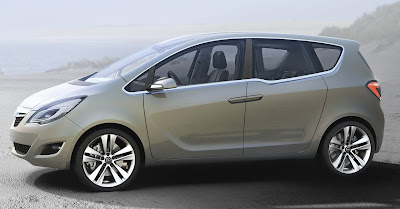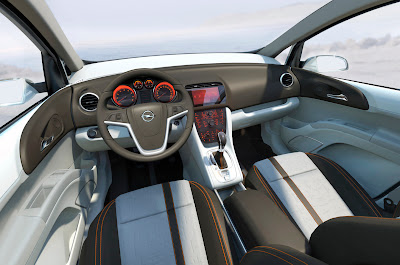Following a leakage on the net last Tuesday, Opel released five official images and yet another teaser press release containing initial information on its upcoming Meriva Concept that will debut at the Geneva Show next week. The compact minivan concept previews the second generation Meriva and possibly, a future Saturn model that could compete against the Honda Jazz. Apart from its more bold design language compared to the current generation Meriva, the concept also features rear-hinged rear doors that swing open toward the back of the car
Press Release:
Meriva Concept: Dynamic Design And Innovative FlexDoors System
-FlexDoors make monocabs more versatile, comfortable and safer
-Design: New level of dynamics and improved practicality
Rüsselsheim. The Opel Meriva Concept, due to be unveiled next week at the 78th International Motor Show in Geneva (March 6 – 16, 2008), illustrates how the new Opel design language can be adapted to create bold, fresh design solutions for this segment.
The Opel Meriva Concept takes flexibility to new heights with its innovative FlexDoors system, which consists of rear-hinged rear doors that swing open toward the back of the car. As the B-pillars have been purposely retained for passive security reasons, the Meriva Concept’s front and rear doors can also be opened independently of each other. Other rear-hinged rear doors already on the market can only be opened after the front door has been opened. This innovation makes access to the car interior much easier and also offers a range of safety benefits over conventional car doors. In the Meriva Concept, this innovation is combined with the highly variable FlexSpace rear seating system familiar from the production Meriva.
The FlexDoors system also enhances comfort and functionality, as the highest point of the roof – just behind the B-pillars – is exactly where the passengers enter and exit the vehicle. This architecture enabled designers to create a very dynamic and unique silhouette, with the arched roof line sloping down to the C-pillars.
Especially eye-catching is the dynamic “wave” in the window line just behind the B-pillars, which provides an excellent all-round view for rear passengers, particularly for children. The body also boasts the distinctive ”blade” bodyside form, which was a design element of the GTC Coupé and Flextreme. Another feature is the U-shaped windshield, which stretches up and back over the rear passengers’ heads – echoing the Astra GTC’s panorama windshield. The slim A-pillars and windshield pulled far down ensure plenty of light and a spacious interior atmosphere. Both elements contribute to the outstanding all-round visibility for the occupants.











0 comments:
Post a Comment